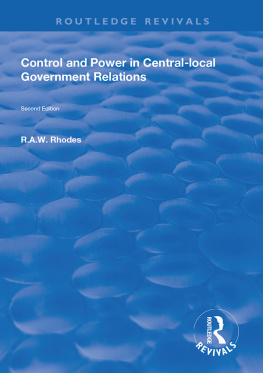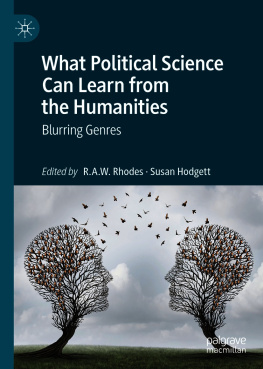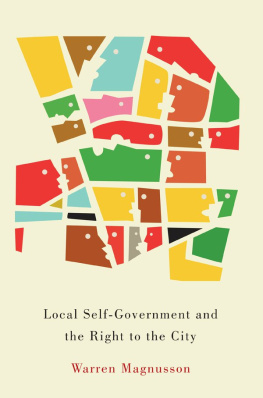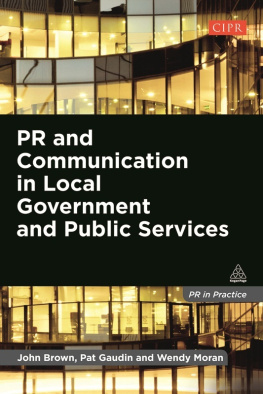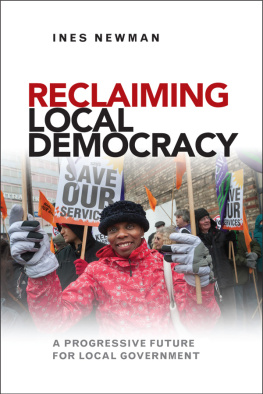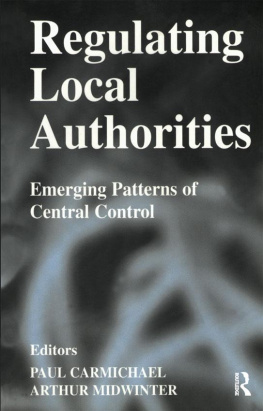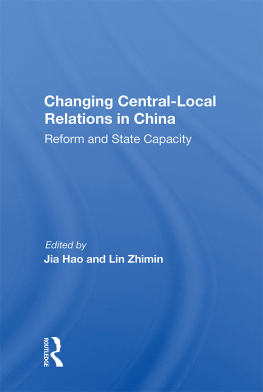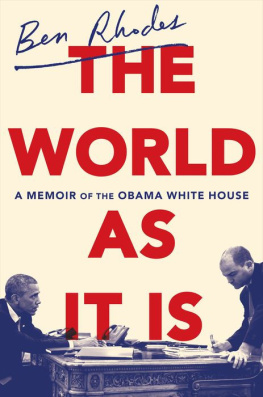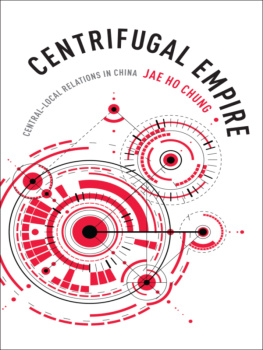CONTROL AND POWER IN CENTRAL-LOCAL GOVERNMENT RELATIONS
First published 1999 by Ashgate Publishing
Reissued 2018 by Routledge
2 Park Square, Milton Park, Abingdon, Oxon OX14 4RN
711 Third Avenue, New York, NY 10017
Routledge is an imprint of the Taylor & Francis Group, an informa business
Copyright R. A. W. Rhodes 1999
All rights reserved. No part of this book may be reprinted or reproduced or utilised in any form or by any electronic, mechanical, or other means, now known or hereafter invented, including photocopying and recording, or in any information storage or retrieval system, without permission in writing from the publishers.
Notice:
Product or corporate names may be trademarks or registered trademarks, and are used only for identification and explanation without intent to infringe.
Publishers Note
The publisher has gone to great lengths to ensure the quality of this reprint but points out that some imperfections in the original copies may be apparent.
Disclaimer
The publisher has made every effort to trace copyright holders and welcomes correspondence from those they have been unable to contact.
A Library of Congress record exists under LC control number: 99015646
Typeset by Manton Typesetters, Louth, Lincolnshire, UK.
ISBN 13: 978-1-138-61221-1 (hbk)
ISBN 13: 978-0-429-46351-8 (ebk)
To: CMR, thank you.
This book attempts to provide a reinterpretation of central-local relations in Britain. To be precise, it has four objectives.
(i) To identify the strengths and weaknesses of the existing literature and to provide a bibliographical guide for both students and those who might wish to carry out research in the field in the future.
(ii) To demonstrate that a focus on the links between central departments and local authorities is restrictive. The subject needs to be redefined as intergovernmental relations in order to encompass the range of relationships between the various units of government.
(iii) To develop a theory of intergovernmental relations which not only raises interesting questions about the specific topic but also relates the study of intergovernmental relations to broader issues in the study of British government.
(iv) To identify a coherent programme of future research.
The book has had a somewhat unusual history and a brief note on its conception and gestation will help to explain the form of its birth. Its conception lies in a commissioned paper for the Committee of Inquiry into Local Government Finance (Layfield) published in 1976. Subsequently, I presented papers on future research into central-local relations to the Social Science Research Councils (SSRC) Panel on Research into Local Government (April 1977) and to a Public Administration Committee Working Group on Research into Central-Local Relations (November 1977). In January 1978, I was invited to join the SSRC Panel on Central-Local Government Relationships and I was asked to produce a review of the existing literature on the subject and to develop the analytical framework outlined in the foregoing papers. My paper for the Panel was completed in May 1978 and the Panels own report was produced in January 1979. The Panels recommendations were accepted by the Research Initiatives Board of the SSRC and, as part of the continuing effort to stimulate research into central-local relations, the SSRC decided to sponsor the publication of a number of the papers commissioned by the Panel. This book is a revision of the full-length version of my paper for the Panel.
In revising the original paper, I have not attempted to provide a guide to recent changes in the system of central-local relations. Rather the emphasis has remained on reviewing existing literature and research and as yet there has been little research on current developments. Accordingly, I have concentrated on providing a perspective for the future study of central-local relations and the revisions have taken the form of clarifying the argument and effecting a reduction in the length of the original SSRC paper.
I was greatly aided in the process of revisions by the critical comments of my colleagues on the Panel. Early drafts of various sections of the paper were presented to a number of conferences and seminars. I would like to thank the Department of Politics (Aberdeen); the Department of Politics (Strathclyde); the Royal Institute of Public Administration (Edinburgh and East of Scotland Branch); the Institute of Local Government Studies (Birmingham); the Local Politics Group of the Political Studies Association (Birmingham and London); and the participants of the Public Administration Committee Annual Conference (York) and the Policy Studies Conference (Birmingham) for their patient and friendly criticism.
A number of individuals have also commented, either in whole or in part, on various drafts. My thanks to Doug Pitt (Strathclyde), Barbara Webster (Inlogov), Ed Page (Strathclyde), Ken Benson (Missouri-Columbia), Mike Goldsmith (Salford) and Bob Goodin (Essex). The first draft was written while I was a member of the Department of Administration, University of Strathclyde, and I must thank Lewis Gunn for his help and support. At different times, Ed Page and Kevin Pudney expedited the compilation and checking of the bibliography and Brian Hardy provided invaluable assistance at every stage in the preparation of the final manuscript. Maureen Russell (Strathclyde), Pat Caplin (Essex) and Desne Harrington (Essex) have patiently typed and retyped the various drafts. Finally, George Jones (LSE) and John Stewart (Inlogov) have been endless sources of criticism and encouragement and I owe both of them a special debt of gratitude. As ever, the responsibility for the remaining shortcomings is mine alone.
The author and publisher would like to thank the following who kindly gave permission for quotations to be included from their publications: The Clarendon Press for R.J. May, Federalism and Fiscal Adjustment; Town Planning Review for R.A.W. Rhodes, Some Myths in Central-local Relations; G.W. Jones for Responsibility and Government; American Elsevier and the European Journal of Political Research for R.A.W. Rhodes, Understanding Intergovernmental Relations.
ROD RHODES
Colchester,
March 1980.
I was weaned on the American behavioural political science of the 1960s. Until I was 50,1 had never read R.G. Collingwood or Hayden White. Their blend of philosophy and history was a revelation. I became enamoured of Collingwood. As Stephen Toulmin describes him, he was a lone wolf; one of those English nonconformists who are fated to end up creating a party of one member (Collingwood, 1978). Pigeon-holed as an idealist, he forswore the occasional remonstrance; I became used to it: otherwise I might have been too much annoyed to keep that rule against answering critics which every one must keep who has work of his own to do (ibid., p.56). But, and the reason for this excursion, his advice on critics for the more mature scholar was sound:
I am nearly fifty, and cannot in any case hope for more than a few years in which I can do my best work. I take this opportunity, therefore, of saying that I will not be drawn in to discussion of what I write. Some readers may wish to convince me that it is all nonsense. I know how they would do it; I could invent their criticisms for myself. Some may wish to show me that on this or that detail I am wrong. Perhaps I am: if they are in a position to prove it, let them write not about me but about the subject, showing that they can write about it better than I can; and I will read them gladly. And if any think my work good, let them show their approval of it by attention to their own. (Ibid., pp.118-19)

